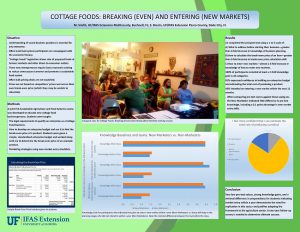Situation: An understanding of sound business practices is essential for any enterprise. However, too often participants in the local food system are unequipped with the economic literacy necessary to navigate the system. In 2011, Florida passed legislation permitting food operations designated as “Cottage Foods” to sell prepared foods at farmers markets and other direct-to-consumer outlets. These new entrepreneurs, like professional growers, require basic economic training to reduce unnecessary turnover and promote a sustainable food system. Too often, bulk pricing deals are not exploited, prices are set based on competitors’ prices and not on their own break-even price (which they may be unable to calculate), and the enterprise suffers. By teaching these concepts, we attempt to reduce business failure and bolster the sustainability of the local food system.
Methods: A joint FCS-Sustainable Agriculture and Food Systems course was developed to educate new cottage food businesspersons. FCS focused on the legal requirements to qualify an enterprise as a Cottage Food business. My portion focused on developing an enterprise budget, using the budget to find the break-even price of a product, and marketing strategies. Students were given a simple, standardized enterprise budget and worked along with me to determine the break-even price. During the marketing section, students were taught to use new-market-entry checklists developed through a 2015 USDA Specialty Crops Block Grant program comprised of myself and Panhandle Agriculture and FCS agents.
Results: Participants to the workshops were given a pre/post-test to determine baseline economic knowledge and knowledge gains. 100% of participants recorded at least a 200% knowledge gain in all categories.
Conclusion: Very low pre-test values and strong knowledge gains demonstrate the need for replication in this sector and justifies adopting the framework to the agriculture sector. A one-year follow-up survey is needed to determine ultimate success.
 0
0

